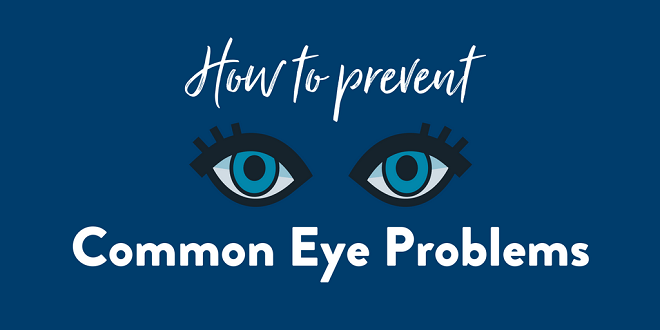How to Prevent Common Eye Problems

There are approximately 200 eye diseases. Some of them include the common dry eye disease DED, while others can cause complete blindness. Some have no symptoms, and others can cause complete blindness. There are many treatments that pharmacists and healthcare professionals can offer to reduce the risk of vision loss. This article will explain how to identify patients at high risk and help them prevent common eye problems.
1- Reduce Your Alcohol Intake
An unhealthy lifestyle, which includes alcohol abuse, can cause vision problems. DED, also known as Keratoconjunctivitis sicca, is a condition where the eyes don’t produce enough tears, or they evaporate too quickly. This causes the eyes to dry up, become red and swollen, and can cause irritation. DED symptoms can be exacerbated by alcohol consumption.
Heavy alcohol consumption has been shown to be a factor in age-related macular disease and other causes of blindness. Heavy drinking (defined as more than 30g per day) is linked to a higher risk of developing AMD. Alcohol has been shown to increase the risk of developing AMD by altering processes that prevent oxidative damage. People who consume a lot of alcohol are more likely to develop cataracts (clouding the eyes’ lens). The connection between alcohol and cataracts is not clear.
2 Stop Smoking
A history of smoking cigarettes has been shown to increase the likelihood that AMD will develop and be more common. A history of smoking cigarettes has been shown to be a factor in the formation of cataracts. Diabetic Retinopathy (the blockage of blood vessels in the back of the eye), DED and glaucoma are all related. This is a condition that affects the optic nerve.
3 Use Sunglasses to Protect Your Eyes from the Sun’s Rays
High levels of UV (UV) light exposure have been shown to be linked to a variety of eye diseases including cancer and cataracts. While prescription glasses come with a UV filter, not all sunglasses have the same. It is important to counsel patients about the safety of their sunglasses.
4 – Reduce Screen Time
Computer vision syndrome (CVS) is a common eye condition that can be linked to computer use. It has reached its peak because of our increased reliance on digital devices. The following four categories are common for CVS symptoms:
- Strain your eyes
- Dry or painful eyes due to irritation of the ocular surface
- Visual fog; trouble focusing
- Other symptoms that are not ocular
To avoid fatigue, anyone who spends time at a computer screen or on a monitor should be taught to follow the 20:20.20 rule. This means that every 20 minutes individuals must take a 20 second break and then focus on something 20 feet away.
Adjust lighting, glare, ventilation and screen design to improve the viewing environment.
Follow these simple guidelines to manage aqueous-deficient DED.
- Use ocular lubricants or artificial tears to treat.
- For moderate to severe symptoms, topical anti-inflammatory drugs such as cyclosporine or non-steroidal antiinflammatory eye drops (or corticosteroid eyes drops) can be used.
- Sometimes, sodium hyaluronate is required to treat advanced DED.
- OTC eye drops can be used to relieve symptoms. OTC eye remedies come in sprays, drops, gels, ointments, etc.
5 Consistently Perform Vision Testing
For most adults, the recommended frequency for an eye exam is every two years. Some high-risk patients should have their eye exams more frequently. Patients who are:
- Afro-Caribbean and Asian
- Are you 40 years old or older
- Glaucoma in your family history
- Diabetic?
- High blood pressure
- There is a greater risk of taking topical or systemic corticosteroids.
6 Follow the Expert’s Instructions Concerning Lens Hygiene
Contact lenses can cause complications if there is a foreign object or a warm and wet environment.
- Make sure you have clean hands before handling contact lenses.
- Acanthamoeba can cause vision-threatening infections if you use tap water for your lens washing.
- Optometrists will often recommend a particular brand of contact lenses.
- Contact lens cases should always be cleaned with lens solution. The solution should be changed after each use of the lens.
- If you are not instructed by an optometrist, or eye care professional to swim or bathe while wearing contact lenses, it is best to avoid.
- Never swap lenses or share them.
- Apply makeup and then remove it once you have removed your contacts.
- Wearing lenses for more than 16 hours per day increases the risk of developing microbial keratitis or DED.
- If the lenses are not made specifically for such purposes, they should not be worn over night.
- Follow-up appointments should be scheduled at least once a year.
- If you experience redness, pain, or if your vision is blurred or lost due to any other reason, consult an optometrist.
To prevent common eye problems, you should follow the advice above. You should not ignore any discomfort you feel in your eyes and visit a specialist. To get an expert and thorough checkup, you should visit an Eye Specialist Lahore. Marham can help you make an appointment to see the best eye specialist in Lahore.
Frequently Asked Questions (FAQs
1 Is it better for your eyes to use the dark mode?
The dark mode can be beneficial for those who spend a lot time staring at the screen. It will reduce eye strain and dryness. The dark mode is not proven to increase your device’s battery lifespan.
2 Is it safe for me to use a blue-light filter?
Research shows that cutting out 94% blue light can lower cancer risk. Numerous studies have shown that blue light exposure can lead to visual impairments. Nearly 100 percent of blue light entering your eyes is absorbed by the back of your retina.
3 Is it beneficial for computer glasses to be used?
Computer glasses can be helpful if you have digital eye strain.




